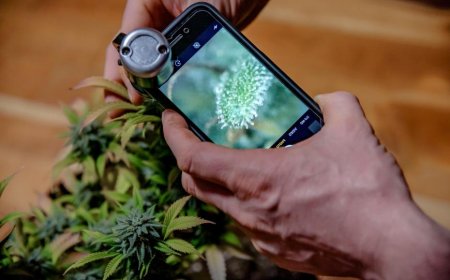How to Make Marijuana Coffee
Learn how to make marijuana coffee with our easy guide! Explore benefits, ingredients, and methods for the perfect cannabis-infused brew.

Marijuana coffee has been gaining traction among cannabis connoisseurs, as it combines the energizing properties of caffeine with the calming and therapeutic advantages of marijuana. In this guide, we will explore how to infuse your coffee with cannabis and the importance of decarboxylation in activating cannabinoids, along with essential ingredients and equipment needed for making edibles at home.
We will discuss the benefits of marijuana coffee and why it might be an excellent addition to your daily routine. The importance of decarboxylation in activating cannabinoids within your brew will also be covered, along with essential ingredients and equipment needed for making edibles at home.
Additionally, we'll explore different ways to customize your cannabis-infused coffee by incorporating other flavorful components such as cannabis honey or simple syrup. Finally, we'll touch upon proper storage techniques and dosage control tips so that you can safely enjoy your homemade weed coffee without any worries.
In learning how to make cannabis coffee through our guide, you're sure to elevate your regular morning ritual into something truly extraordinary.
Table of Contents:
- Benefits of Marijuana Coffee
- Potential Effects on Mood and Energy Levels
- The Role of Cannabinoids in Enhancing Your Coffee Experience
- Microdosing for Optimal Effects
- Ingredients and Equipment Needed
- How to Make Marijuana Coffee
- Methods for Infusing Cannabis into Coffee
- Importance of Decarboxylation
- Additional Ingredients and Flavorings
- Storage and Dosage Control
- How to Make Marijuana Coffee
- What You'll Need
- Instructions
- Why Make Marijuana Coffee?
- Enjoying Marijuana Coffee
- FAQs in Relation to How to Make Marijuana Coffee
- Conclusion
Benefits of Marijuana Coffee
If you enjoy both the energizing and soothing properties of cannabis and coffee, combining them could produce a unique blend that will provide an invigorating yet calming experience. Combining the energizing effects of caffeine with potential mood-enhancing properties from cannabinoids, marijuana coffee is an appealing option for those seeking to enhance their daily routine or explore cannabis consumption.
Potential Effects on Mood and Energy Levels
Caffeine is known to bring about heightened alertness and concentration, while some cannabis strains may have the capability of producing calming or mood-lifting effects. When combined in marijuana coffee, these substances may work together synergistically to offer a balanced boost in energy without causing jitters or anxiety. This makes it ideal for individuals looking for a smoother alternative to traditional caffeinated beverages.
The Role of Cannabinoids in Enhancing Your Coffee Experience
Marijuana contains various cannabinoids that interact with your body's endocannabinoid system (ECS), which plays a crucial role in regulating mood, appetite, pain sensation, and more. By infusing your coffee with cannabis products such as CBD oil or THC-infused milk, you could potentially enhance your overall experience by tapping into these beneficial compounds.
- CBD: Known for its non-intoxicating effects and potential health benefits like reducing inflammation and anxiety relief; adding CBD oil to your morning cup might help start your day off on a positive note.
- THC: The psychoactive compound found in marijuana responsible for inducing euphoria; incorporating THC-infused milk or tinctures can add a recreational element to your coffee routine.
Microdosing for Optimal Effects
When experimenting with marijuana coffee, it's essential to start with low doses and gradually increase as needed. By gradually increasing the dosage, microdosing can help you find an optimal balance of cannabinoids and caffeine that suits your needs while avoiding overconsumption. It also helps prevent overconsumption, ensuring a safe and enjoyable experience.
Incorporating cannabis into your daily cup of joe can provide an exciting twist on traditional caffeinated beverages while potentially offering therapeutic benefits. By understanding the potential effects of marijuana coffee and practicing responsible consumption through microdosing, you can enjoy this unique combination in a way that suits your preferences.

Ingredients and Equipment Needed
To make marijuana coffee, you'll need a few essential ingredients and equipment. Having the right tools on hand will ensure a smooth process and an enjoyable final product.
Cannabis Buds or Infused Products
You can use cannabis buds or pre-made infused products like cannabis oil, tinctures, or butter for your infusion. The strain of cannabis you choose will impact the flavor profile and effects of your coffee. Consider experimenting with different strains to find one that complements your preferred taste in coffee.
Coffee Beans
Select high-quality coffee beans for the best results. Freshly roasted beans provide optimal flavor when brewed alongside cannabis-infused ingredients.
Brewing Equipment
- French Press: A French press is ideal for making cannabis coffee because it allows full immersion of ground coffee with hot water, ensuring proper extraction of both caffeine and cannabinoids from the mixture.
- Drip Coffee Maker: You can also use a drip coffee maker by adding finely ground cannabis directly into the filter basket along with your regular ground coffee.
- Moka Pot: For those who prefer espresso-based drinks, a Moka pot works well as it brews under pressure which helps extract more flavors from both the coffee grounds and cannabis material.
Tips for Grinding Cannabis Finely:
- Use a dedicated cannabis grinder or an electric coffee grinder to achieve a fine consistency.
- Avoid using your regular coffee grinder for grinding cannabis, as it may leave residue that can affect the taste of future non-infused brews.
With the proper supplies on hand, you're now ready to start combining cannabis and coffee for a medicinal morning beverage. In the next section, we'll explore various methods for incorporating cannabis into your coffee brewing process.
How to Make Marijuana Coffee
If you're a fan of both coffee and cannabis, why not combine the two for a delicious and invigorating beverage? In this article, we'll explore several methods for infusing cannabis into your coffee, so you can enjoy the benefits of both substances at the same time.
Methods for Infusing Cannabis into Coffee
One can employ various approaches to adding cannabis into coffee, each with its own pros and cons. The following methods will help you create a delicious marijuana-infused beverage that suits your taste preferences:
Cannabis-Infused Milk or Creamer
If you want to add milk or creamer to your coffee, this method is perfect for you. Start by making cannabis-infused milk or creamer, which involves heating the dairy product with ground cannabis buds over low heat for an extended period of time. Once the infusion process is complete, strain out any plant material and store your cannabis-infused dairy product in a sealed container in the refrigerator for later use.
- Pros: Easy to make; can be used in various recipes beyond coffee.
- Cons: Requires additional preparation; may have a shorter shelf life than other options.
Cannabis Tincture Additive
A cannabis tincture is an alcohol-based extract that can easily be added directly to brewed coffee without altering its flavor too much. To make a tincture, simply soak decarboxylated cannabis buds in high-proof alcohol (such as Everclear) for several weeks before straining out the plant material and storing it in dropper bottles. This allows precise control over dosage while maintaining consistency across different servings of coffee.
- Pros: Easy to dose; long shelf life.
- Cons: Requires patience for the infusion process; alcohol may not be suitable for all users.
Cannabis-Infused Coffee Beans
If you prefer a more direct approach, consider infusing cannabis directly into your coffee beans. This method involves coating roasted coffee beans with a cannabis-infused oil (such as coconut oil) and allowing them to dry before grinding and brewing. The resulting brew will have a distinct cannabis flavor that can be adjusted by using different strains or adjusting the amount of infused oil used during preparation.
- Pros: Unique flavor profile; easy to adjust potency based on personal preferences.
- Cons: May require experimentation to find desired taste balance; potential for uneven distribution of cannabinoids across servings if not prepared carefully.
No matter which method you choose, remember that proper dosage is key when it comes to enjoying marijuana coffee responsibly. Start with small amounts of infused ingredients and gradually increase until you find your ideal balance between caffeine stimulation and cannabinoid relaxation.
Importance of Decarboxylation
Before diving into the process of making marijuana coffee, it's crucial to understand the importance of decarboxylation. This step is essential for activating the cannabinoids in cannabis, ensuring that you experience their full potential when combined with your favorite caffeinated beverage.
What is Decarboxylation?
Decarboxylation is a chemical reaction that occurs when cannabis is heated, converting inactive compounds like THCA and CBDA into active forms such as THC and CBD. These activated cannabinoids are responsible for producing the desired effects associated with consuming cannabis-infused products.
How to Decarboxylate Cannabis Properly
- Preheat your oven: Set your oven temperature between 220°F (104°C) and 245°F (118°C). It's important not to exceed this range since higher temperatures can degrade cannabinoids or cause them to evaporate.
- Bake time: The optimal baking time varies depending on factors like humidity levels and personal preferences; however, most people find success by baking their ground cannabis buds for about 30-45 minutes.
Tips for Successful Decarboxylation
- To ensure even heating during decarboxylation, spread your finely ground cannabis evenly across a parchment-lined baking sheet or an oven-safe dish covered with aluminum foil.
- Avoid opening the oven door frequently while decarbing; this can cause fluctuations in temperature which may affect cannabinoid activation rates.
Finding Your Ideal Decarboxylation Time
It's essential to find the perfect decarboxylation time for your cannabis, as this can impact the potency and overall experience of your cannabis coffee. Experiment with different baking times within the recommended range to determine what works best for you.
Why Decarbing Matters in Marijuana Coffee
By properly decarboxylating your cannabis before infusing it into coffee, you'll ensure that all cannabinoids are activated and ready to interact with your body's endocannabinoid system. This will result in a more potent and effective beverage, allowing you to fully enjoy the synergistic effects of caffeine and cannabis together.
Incorporating decarboxylated cannabis into your cannabis coffee recipe is an essential step towards creating a balanced, enjoyable drink. By utilizing the right approach and experimenting, one can unlock the full potential of both caffeine and cannabinoids for an unparalleled energizing experience.
Additional Ingredients and Flavorings
Enhance your cannabis coffee experience by adding a variety of ingredients and flavorings to suit your taste preferences. These additions not only improve the overall taste but can also complement the effects of cannabis, making for an even more enjoyable beverage.
Sweeteners
Sweeten your cannabis coffee with natural sweeteners like honey, maple syrup, or agave nectar. Alternatively, you can use sugar substitutes such as stevia or erythritol if you're watching your calorie intake. Adjust the sweetness level according to your personal preference.
Creamers
Add creaminess to your infused coffee by using dairy products like milk, half-and-half, or heavy cream. For those who prefer non-dairy options, try almond milk, coconut milk, oat milk, or soy milk as alternatives that still provide a rich texture without compromising on flavor.
Spices and Flavors
- Cinnamon: Sprinkle some ground cinnamon into your cup for a warm spice kick that pairs well with both caffeine and cannabinoids.
- Nutmeg: A pinch of nutmeg adds depth and complexity to the flavors in cannabis coffee while enhancing its aroma.
- Vanilla Extract: A few drops of pure vanilla extract can elevate the overall taste profile of cannabis-infused beverages by providing a subtle hint of sweetness.
- Mint Leaves: Fresh mint leaves offer an invigorating twist when added directly into hot brewed coffee before stirring in cannabis-infused oil or tincture. The cooling sensation of mint can help balance the stimulating effects of caffeine and cannabis.
Whipped Cream Topping
To make your cannabis coffee feel more indulgent, top it off with a dollop of whipped cream. One can either opt for pre-made whipped cream or make their own with a few simple ingredients. Try topping your marijuana coffee with a dusting of cocoa or cinnamon for an extra special flavor and aesthetic.
Experiment with these additional ingredients and flavorings to create a personalized cannabis coffee experience that caters to your taste buds while enjoying the synergistic effects of cannabis and caffeine.
Storage and Dosage Control
Proper storage and dosage control are essential when it comes to enjoying marijuana coffee safely and effectively. By following these guidelines, you can ensure that your cannabis-infused beverage remains fresh, potent, and enjoyable for an extended period.
Storing Marijuana Coffee
To maintain the freshness of your marijuana coffee, store it in an airtight container away from direct sunlight or heat sources. This will help preserve the potency of cannabinoids like THC and CBD, as well as prevent any unwanted odors from permeating your living space. A dark glass jar with a tight-fitting lid is ideal for this purpose.
Dosage Considerations
Finding the right balance between caffeine content and cannabinoid concentration is crucial to achieving desired effects without overdoing it. Here are some tips on how to manage dosages:
- Start low: If you're new to cannabis coffee or unsure about your tolerance levels, begin with a lower dose of cannabis (around 5-10mg THC) per cup.
- Increase gradually: As you become more familiar with the effects of cannabis coffee on your body, feel free to increase the dosage incrementally until you find what works best for you.
- Mind the caffeine: Remember that caffeine can also have stimulating effects; therefore, be mindful not only of cannabis dosages but also how much caffeinated coffee you consume throughout the day.
- Note individual differences: Each person's metabolism varies - what may work perfectly fine for one individual might be too much or too little for another. Always listen to your body and adjust dosages accordingly.
Measuring Cannabis Dosage
To ensure accurate and consistent dosing of cannabis in your coffee, consider investing in a THC/CBD testing kit or opting for pre-dosed products such as tinctures, oils, or infused milk. This will help ensure that you're consuming consistent doses every time you enjoy your cannabis coffee.
In conclusion, proper storage and dosage control are key to enjoying cannabis coffee safely and effectively. By following these guidelines, you can ensure that your cannabis-infused beverage remains fresh, potent, and enjoyable for an extended period.
How to Make Marijuana Coffee
If you're a coffee lover and a cannabis enthusiast, you might be curious about how to combine these two passions. Fortunately, making marijuana coffee is a simple process that can be done at home with a few basic ingredients and tools.
What You'll Need
- 1 cup of brewed coffee
- 1 tablespoon of cannabis-infused coconut oil or cannabis butter
- 1 tablespoon of regular coconut oil (optional)
- 1 tablespoon of cannabis milk or regular milk (optional)
- 1 teaspoon of cannabis sugar or regular sugar (optional)
- 1/4 teaspoon of cinnamon (optional)
- Coffee maker
Instructions
- Start by brewing a cup of your favorite coffee using a coffee maker or any other brewing method you prefer.
- While the coffee is brewing, heat the cannabis-infused coconut oil or cannabis butter in a small saucepan over low heat until it melts.
- If desired, add regular coconut oil, cannabis milk, cannabis sugar, and cinnamon to the saucepan, stirring occasionally until well combined.
- Once the coffee is ready, pour it into a blender and add the cannabis-infused mixture.
- Blend on high for 30 seconds or until the mixture is frothy and well combined.
- Pour the mixture back into your coffee mug and enjoy.
If you don't have cannabis-infused coconut oil or cannabis butter, you can make your own by decarboxylating cannabis and infusing it into coconut oil or butter using a simple recipe from Honest Marijuana.

Why Make Marijuana Coffee?
There are several reasons why you might want to try making cannabis coffee:
- Alternative to smoking: If you prefer not to smoke cannabis, making edibles like marijuana coffee is an excellent way to consume it without inhaling smoke.
- Long-lasting effects: When you consume cannabis through edibles, the active cannabinoids are metabolized by the liver, resulting in a longer-lasting and more potent effect than smoking.
- Customizable: You can adjust the dosage and flavor of your marijuana coffee to suit your preferences and experiment with different strains and infusion methods.
Enjoying Marijuana Coffee
Now that you have learned how to make marijuana coffee, it's time to enjoy the unique experience this beverage offers. For a truly unique experience, try combining different cannabis strains with your favorite coffee blend to find the perfect balance of cannabinoids and caffeine.
To fully appreciate your homemade marijuana coffee, consider the following tips:
- Taste test different strains: Experiment with various cannabis strains to find one that complements your preferred coffee flavor profile. Some strains may offer fruity or earthy notes that pair well with specific types of beans.
- Pace yourself: Start by drinking a small amount (about half a cup) of cannabis coffee to gauge its effects on your body. Remember that everyone reacts differently to cannabinoids and caffeine, so take it slow until you know how the blend affects you personally.
- Create your perfect blend: Customize your drink by adding sweeteners like cannabis honey or agave syrup, spices such as cinnamon or nutmeg, and dairy or non-dairy creamers according to taste preferences. You can also try using flavored syrups from brands.
- Savor the moment: Take time out of your day specifically dedicated to enjoying this special concoction in peace without distractions. This will allow you not only to savor every sip but also tune into any potential therapeutic benefits offered by both caffeine and cannabinoids working together synergistically within our bodies' endocannabinoid system.
Beyond recreational use, some individuals might find relief from certain symptoms through the consumption of cannabis coffee. For example, those suffering from chronic pain or anxiety may experience a reduction in discomfort and stress levels due to the combined effects of cannabinoids and caffeine.
Keep in mind that it's essential to consume cannabis responsibly, especially when combining it with other substances like caffeine. Begin with a small amount and build up slowly, monitoring the way your body responds.
By following these tips and experimenting with different infusion methods, strains, and flavorings, you can create a personalized cannabis coffee experience tailored just for you. Enjoy this unique beverage as part of your self-care routine or share it with friends during social gatherings - either way, it's sure to be an unforgettable treat.
FAQs in Relation to How to Make Marijuana Coffee
What are the benefits of marijuana coffee?
Marijuana coffee combines the stimulating effects of caffeine with the relaxing properties of cannabis, providing a balanced experience. It can help improve mood, focus, and creativity while reducing anxiety and stress. Additionally, it may offer relief from pain and inflammation due to its cannabinoid content.
Do they make marijuana coffee?
Yes, there are commercially available marijuana-infused coffees in states where cannabis is legal for recreational or medicinal use. These products typically contain THC or CBD extracts that have been infused into ground coffee beans or added as an oil during brewing.
Can you grow marijuana in coffee grounds?
Growing marijuana plants in used coffee grounds is possible but not ideal as a primary growing medium. Coffee grounds can be mixed with other soil amendments to provide additional nutrients like nitrogen; however, relying solely on them could lead to poor plant growth due to acidity levels and inadequate drainage.
Can you put cannabutter in coffee?
Cannabutter, which is butter infused with cannabis extract, can be added to your cup of hot brewed coffee for a homemade marijuana-infused beverage. This method allows cannabinoids like THC and CBD to mix well with your drink since both substances dissolve better in fats than water-based liquids.
Conclusion
With this guide, you can craft a cannabis-infused cup of coffee in the comfort of your own home. From understanding the benefits of combining these two substances to learning about decarboxylation and dosage control, you now have all the information needed to create a delicious and potent cup of cannabis coffee.
It's important to always use caution when consuming edibles or other forms of cannabis. Begin with a minuscule amount and bit by bit increase the dosage, keeping track of each intake. With practice and experimentation, you'll soon be able to find the perfect balance for your personal preferences.






































































































































